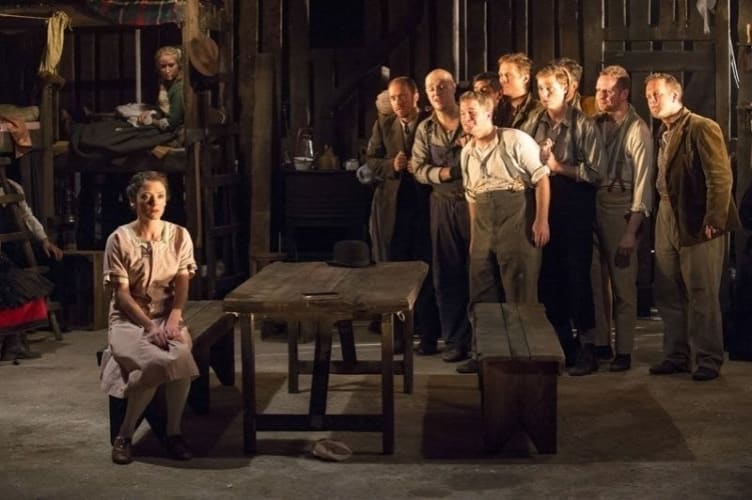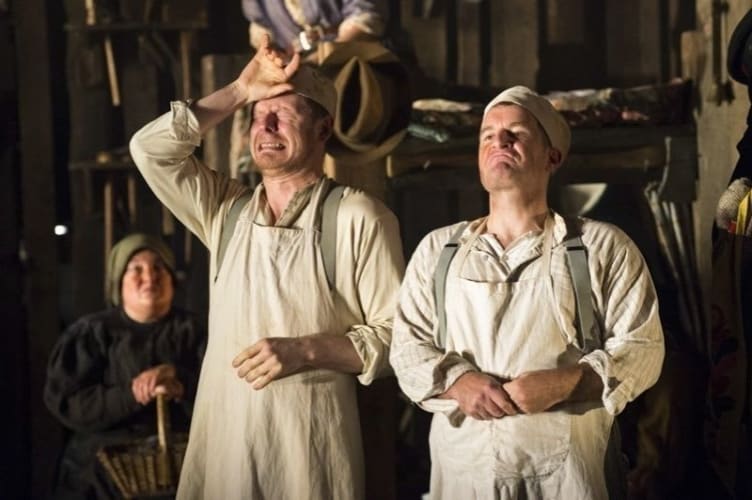Debate is ongoing over whether to Britten’s Paul Bunyan is best described as an opera, an operetta, or something else entirely. It is certainly something of a collector’s item, withdrawn by the composer after its 1941 première, at which it proved a flop. It is a puzzle, but nonetheless an entertaining one.
After the initial failure of the piece, Britten left it aside until he came to work on a revised version in the 1970s, and this version is now presented by English Touring Opera in its current trio of main-stage touring shows, given a lively staging by director Liam Steel.
The music is accessible, even veering on occasion towards the higher-brow of Broadway compositions, taking in on its way jazz and blues inflections, folk balladry, and other popular musical forms. W H Auden’s libretto likewise veers from startling references to Peer Gynt and the Platonic world of ideals, to (deliberate) doggerel which amuses with its blunt and contrived rhymes.
The story is a folk tale of an impossibly massive lumberjack who sets up a community of immigrant workers at the birth of the modern American nation. The superhuman character of Bunyan himself is habitually portrayed by an offstage voice, and in this instance we get Damian Lewis as the disembodied recording of this towering figure.
Bunyan is of course symbolic of the spirit of nation-building which gripped America in the early 19th century (and arguably ever since). This piece touches on the optimism and violence of the time, the melting-pot of cultures, and the uncertainty of this New World. The seeds of capitalist expansion are also lightly mocked in a humorous duet between chefs competing to push their product on the camp’s inhabitants, their language echoing the endorsements and incitements of mid-20th century American advertisements.
There are also ballad interludes, led, acoustic guitar in hand, by Mark Wilde’s character, Johnny Inkslinger. His is one of the most interesting and fleshed-out roles, with his loner, artistic nature forced to compromise, if temporarily, for the sake of the security brought by his job as book-keeper within the community.
So the varied and rich set of musical and thematic influences absorbed by Britten and Auden at the time provides an intriguing, though not always satisfying, patchwork of Americana.
Liam Steel’s staging does much to animate the company. He and designer Anna Fleischle have entirely set the production within a barn-like structure, and the aforementioned interludes echo the folk-tale nature of the piece, with company members taking on the roles of those described in the ballads. At times they even become animals, as in the rather inconsequential episode between the cats and dog of the barn, or in the more dramatically interesting dream sequence experienced by impressive baritone Wyn Pencarreg.
Steel’s trademark choreography adds much to the visual impact of the show, and some beautiful images are conjured through a combination of this and Guy Hoare’s lighting design. The large cast of twenty-two singers manoeuvres effectively and easily around the stage—no mean feat while producing such uniformly strong vocal performances. At times, though, the possibility of a more open set might have enabled a greater sense of the wilderness beyond, waiting to be tamed by these settlers.
Let this not detract from the achievements of the orchestra (under Philip Sunderland’s baton), performers and creative team. They have created an accessible and aesthetically unified whole out of a curious little opera, with warmth and wit to be found among the oddities of the tales.

